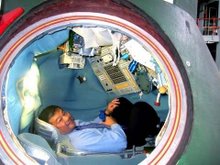Just hours ago, Space X lost it's third Falcon 1 launch vehicle. This is a shame, but it highlights the fact that rockets and spaceflight are complex, difficult endeavors. One of the puzzling facts of this launch, is that it was called Space X's first operational launch. The company had suffered two launch failures in a row, yet felt confident enough to actually put three satellites onto the third and declare the vehicle operational. That doesn't make sense to me. It reminds me of the maiden launch of the Ariane V, which also carried satellites. That rocket too was destroyed early into the flight, with the loss of all payload.
Despite all of this, I do applaud their efforts. Space X was founded in 2004 with the noble idea that there had to be a better and more efficient way to get to orbit. At the time, one major stated goal of the company was to create operational launchers by 2006 which were so efficient that the cost per pound of payload would be reduced by a factor of ten, from $10,000 per pound to $1000 per pound.
Now we are in the second half of 2008 and Space X has not yet successfully launched a rocket to orbit, let alone successfully launch payload for $1000 per pound.
All of the nations which developed successful rocket programs had spectacular failures before getting it right, including Germany, the US, Soviet Union, China, Japan and France. Currently, several countries including India, Iran and North Korea have naescent rocket programs.
If Space X stays at it, I am sure that they too, will be successful. I remain a big believer in the potential for commercial space, including commercial manned spaceflight. But, it's not going to be an easy or quick journey to success.
Leroy Chiao
Devon Island Expedition

This blog features educational updates on my Devon Island Expedition of July 14-20, 2007. Other sites: spaceref.com/blogs/earthclassroom, www.marsonearth.org

Sunday, August 3, 2008
Subscribe to:
Post Comments (Atom)





1 comment:
The future of spaceflight lies with BEP (Beamed Energy Propulsion), prof. Myrabo just re-funded the company (lightcraft technologies) and haven't been idle all these years, if he can fund the hardware (5 to 10 mil) I think it's really the way to go. I'm looking forward to this, maybe we'll finally reach space in our lifetimes in a reliable and relatively cheap way.
Post a Comment